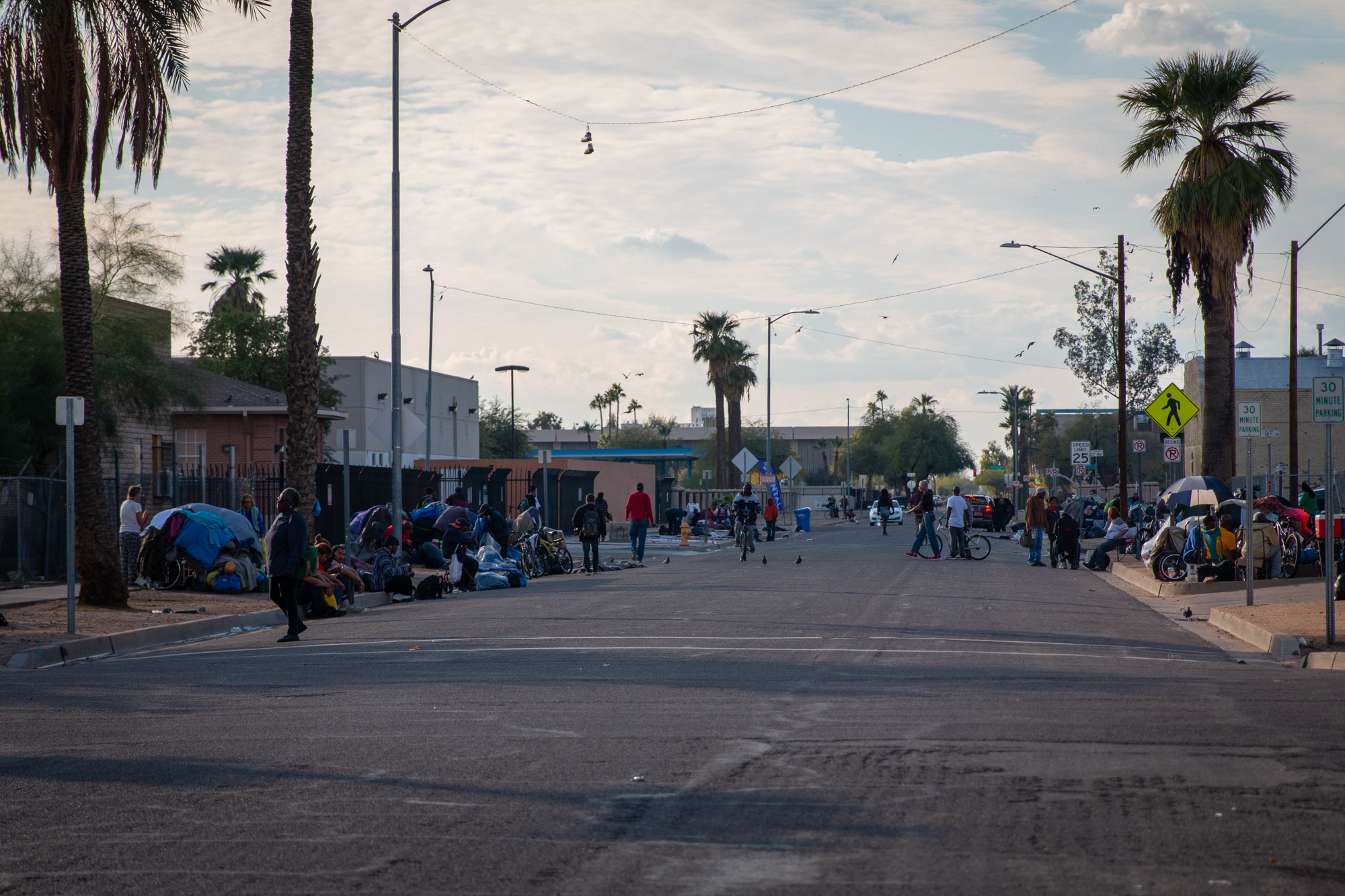
People with nowhere else tyo go mill about the streets of downtown Phoenix on Friday, Nov. 22, 2019. Arizona is among the top 5 states in the nation for lack of affordable housing options for residents living at or below the federal poverty line, according to a 2018 report by the National Low Income Housing Coalition. (Photo by Delia Johnson/Cronkite News)
The hidden homeless: Growing number of older people living on the streets
By Emily Dean/Cronkite News |
PHOENIX – Viola Campbell’s voice shakes as she talks about the steep drop between the life she expected in retirement and her reality.
“I’ve never been homeless before in my life. I’ve always had jobs,” Campbell said.
Still, this is where she is at 75 – looking for kindnesses at Justa Center, a daytime resource center serving people 55 or older.
In its annual report, Central Arizona Shelter Services said it helped more than 1,300 people older than 55 who were experiencing homelessness in the 2018-19 fiscal year. That’s nearly 30% of the people served by the agency, known as CASS. And homelessness in the state is on the rise, according to the Arizona Department of Economic Security.
Advocates for older Arizonans say homelessness isn’t just something that happens to other people. Rather than being spent on golf courses, retirement too often is spent looking for a safe place to sleep at night. Older people also are more vulnerable, putting at greater risk of harm or death.
Each day in the U.S., 10,000 baby boomers – born 1946 to 1964 – turn 65, said Wendy Johnson, executive director of Justa Center.
“Most of these folks worked in an era when wages were low,” Johnson said. “Many of them held entry level or hourly wages for most of their career. Their Social Security checks are between $635 and $750 a month. When you consider that in Maricopa County, landlords mostly ask for three times monthly income for rent, one-third of 700 dollars isn’t (enough for) rent.”
Campbell gets only $777 every month from Social Security. She left California after being priced out of housing, hoping for a better life in Arizona.
A rising problem
Some older people are becoming homeless for the first time, said Lisa Glow, the chief executive of Central Arizona Shelter Services, which provides an overnight shelter.
“There are a lot of economic factors contributing,” she said. “Last year, rent went up 8 percent in Maricopa County. People come here and tell us they couldn’t afford the $100 dollars a month more, so they’re suddenly homeless.”
A 2018 report by the National Low Income Housing Coalition found that, nationally, 1 out of 3 extremely low-income renters is older than 62. An Arizona-specific housing study by the coalition shows a shortage of affordable rentals for “extremely low income” households in Arizona that disappears higher up the income ladder.
Campbell said she didn’t realize the situation she was in until the rent at her California apartment complex started going up $100 per year while she was on a fixed income. She came to Phoenix, hoping it would be more affordable, but soon learned just how wrong she was.
“I thought Arizona was cheaper. I stayed in a Motel 6 for ten days and couldn’t find anywhere (to live). That’s when I ended up at CASS,” Campbell said.
Johnson, executive director of Justa Center, said many baby boomers risk financial instability.
“In the next few years, we will have 50% of the seniors who are in danger of becoming homeless,” she said.
Life on the streets
One day, looking for help, Campbell went to Justa Center, a small facility on West Jefferson Street that provides such services as legal advice, warm meals and shelter from the streets for the day. People line up to use phones, sit on the back patio and huddle in small groups when it’s time for a meal.
Others set up camp outside, near the center. The street is lined with ramshackle shelters made of plastic tarps and cardboard – makeshift attempts to create any semblance of a home. On particularly rainy days, many lie on the sidewalk with large sheets of plastic to keep dry.
Kitty Case, 77, is among those who pass time inside or outside Justa Center, calculating their next move.
“I grew up here. I paid taxes my whole life. My kids are doing good, grandkids are doing good, everyone is doing good – it’s just me,” said Case, who found herself sleeping on bus-stop benches after her rent went up too much.
“I was in a one bedroom apartment. In the time I was there, rent went up $150 a month. I’m on a fixed income,” she said, her voice trembling. “My income doesn’t go up $150 a month. They priced me out. I couldn’t find an apartment fast enough, and I became homeless.”
Case said she walked until her shoes wore out trying to find a place to live. By November, she estimated she had been homeless for about four months, but she can’t be sure because time has become a blur.
“Every day is a year long,” Case said. “At this point, I just can’t find a place to live. I looked at a place that would’ve been perfect. They wanted me to be making 3 1/2 times the monthly rent. Why?”
Karen Hudson, 54, who was setting up a small tentlike structure with a few friends, summed up the situation: “This whole system is not right, you know? Like everything is not going the way it should be.”
Shame and safety
Glow, the CASS chief executive, said older Arizonans living in the streets are more likely to be victimized because they’re perceived as vulnerable.
“You’re easier prey to the predators when you’re older,” Glow said. “You’re not as safe or as capable of defending yourself. Would you want your grandmother sleeping in an alley? That’s what’s happening. They’re terrified. They’re mentally frail, and some of them have Alzheimer’s.”
Hudson and others in her situation have to be careful on two fronts – staying safe from others living in the encampment and avoiding Phoenix police, who often break up encampments like this one.
“They’ll tell you it’s your fault, to stay off the drugs … stuff like that,” Hudson said.
Johnson said government leaders have essentially made homelessness illegal through zoning and forced removal of encampments, especially in the Phoenix area.
“Nobody wants a homeless encampment in their neighborhood, but where are people who are homeless and unsheltered supposed to go?” Johnson said.
What many people experiencing homelessness have to battle, they said over and over again, is a sense of shame for ending up this way after working their whole lives. Some haven’t told their families.
“When my husband and me got thrown out of our apartment, we were outside in the alley,” said Belene Araiza, who said she used to work for the Osborn School District. Then her husband overdosed on pain pills. But she attributes his death to something else.
“We were there for a while. Then, one morning I woke up and he was dead – from being depressed because we were homeless.”
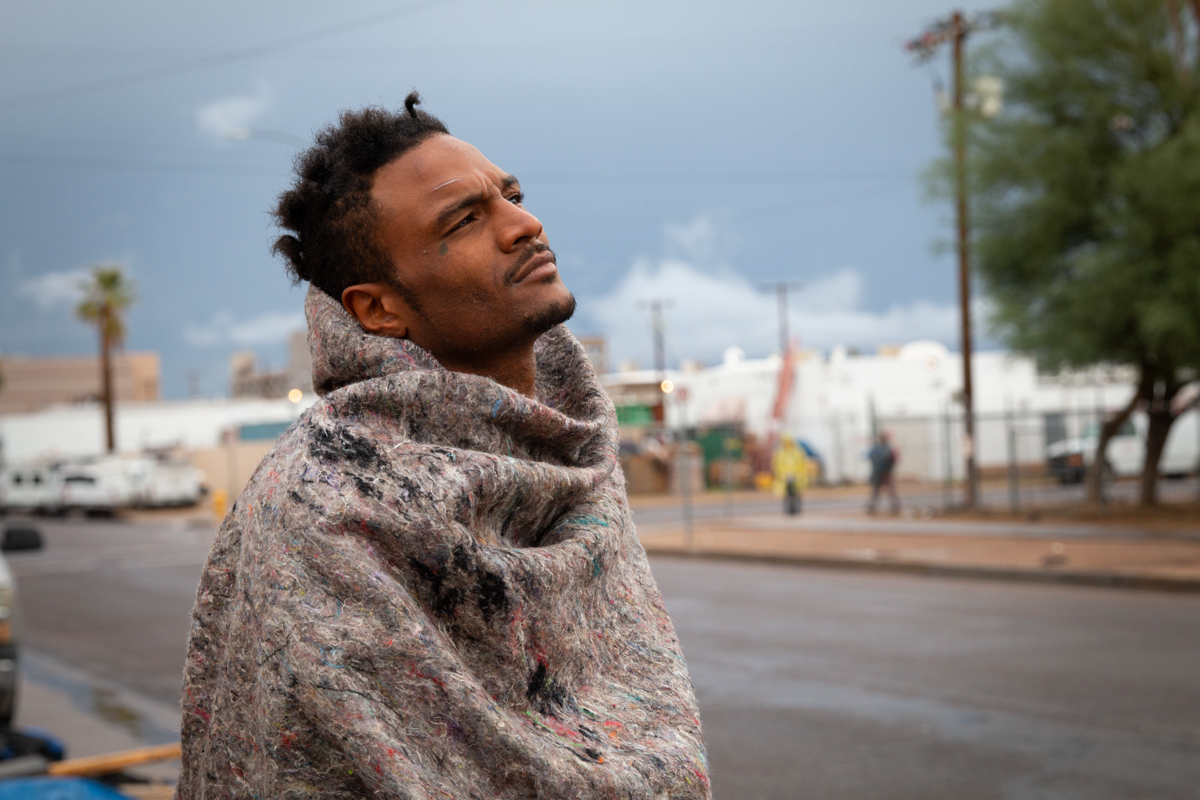
‘This whole system is not right’
Some advocates saw this coming. A 2015 report, Arizona and the Aging Homeless Population, pointed to an increase and urged action.
From 2011-14, it said, there was a 34% increase in Arizonans older than 45 and a 53% increase in homelessness among Arizonans 62 or older.
“Existing systems and policy must adjust to the upcoming surge of people aged 62 and over that will soon flood existing resources and challenge old methods of assisting the homeless,” the Department of Economic Security report said.
Ernest Shaver, an attorney who does pro bono work for Justa Center, said there is a lack of government resources for people who are homeless, particularly older Arizonans.
“I’ve had people leave in tears telling me, ‘Why are you so nice?’ and all I’ve done is sit there and listen to them for 15 minutes and hear them out,” Shaver said. “They just want to be treated with respect.”
Shaver, the only lawyer working with Justa Center, comes in once a week to speak with as many people as he can. Often, he said, people ask him to help them obtain government IDs or maintain court dates.
The cost of groceries, medical needs and most of all housing will continue to climb as retirement income remains steady or increases slowly.
Just do the math to understand the hardship that can lead to being homeless after retirement.
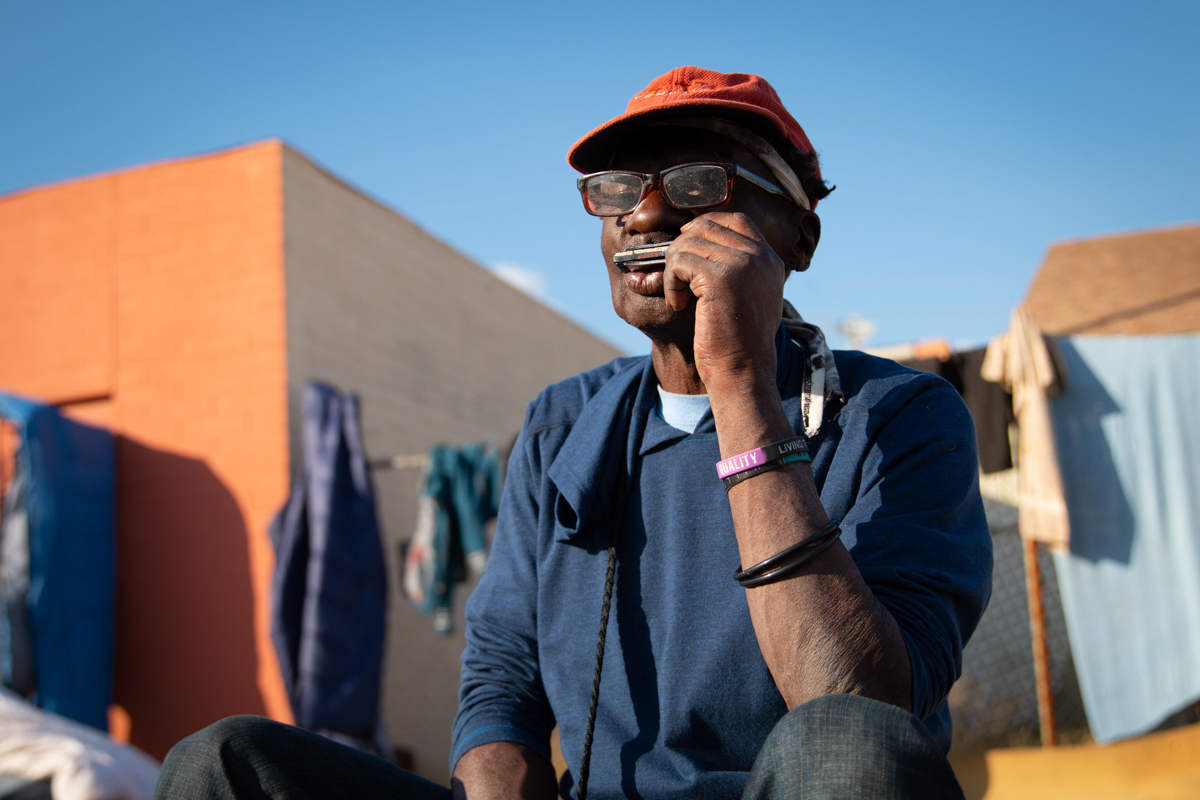
J.R. Capone is one of those who use services offered by Central Arizona Shelter Services and Justa Center in downtown Phoenix. (Photo by Delia Johnson/Cronkite News)
As of September, the average Social Security check benefit for retired workers was $1,474.77 per month. For many, this is not enough to cover rent, groceries and such basic necessities as cleaning supplies and personal hygiene products.
Also as of September, the average cost of rent in Phoenix was $1,085 a month, up 8% from last year.
“We need to intentionally plan for affordable neighborhoods,” Johnson said. “When we’re wiping out a community that’s blighted to rebuild, why are we building $3,000 a month apartments and not homes that could house the people who live and work there?”
Campbell has had a happy ending, at least temporarily. She was placed in housing for at least a year and will receive services that, advocates hope, will keep her off the streets permanently.
Such resources as CASS, Justa Center, Arizona Veterans Stand Down, as well as government services, are working in a sea of need, and advocates say it isn’t enough to hold back the tide.
“It’s time to find a middle ground where we say, ‘I care about my community enough to where I care about the children who are my future, and the elders who brought me to this point,'” Johnson said.
Follow Cronkite News on Twitter.

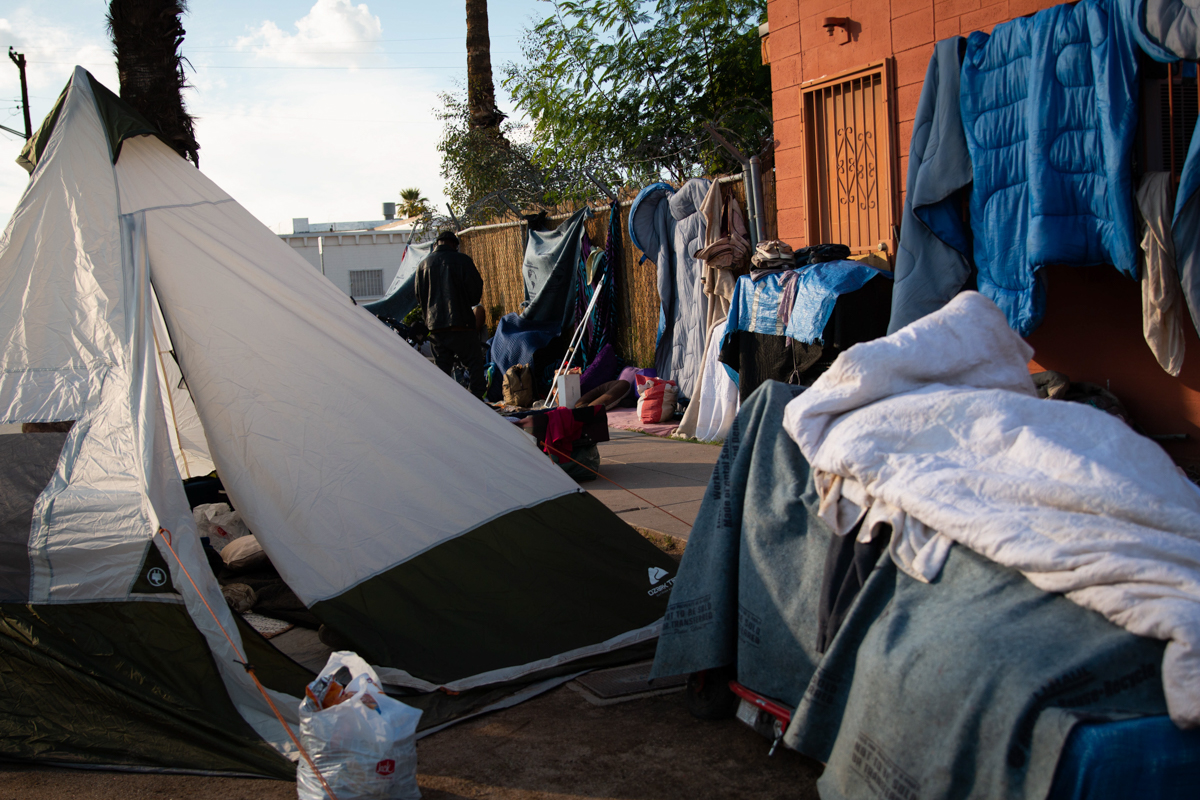
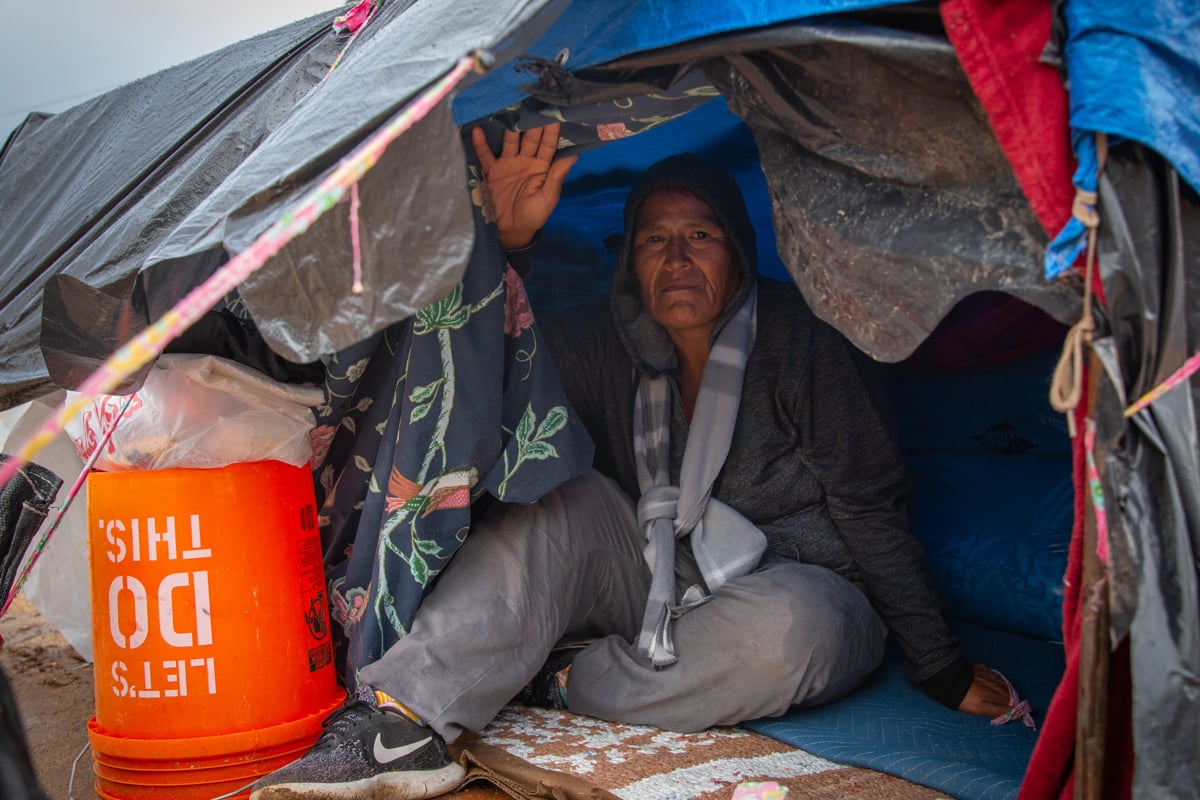





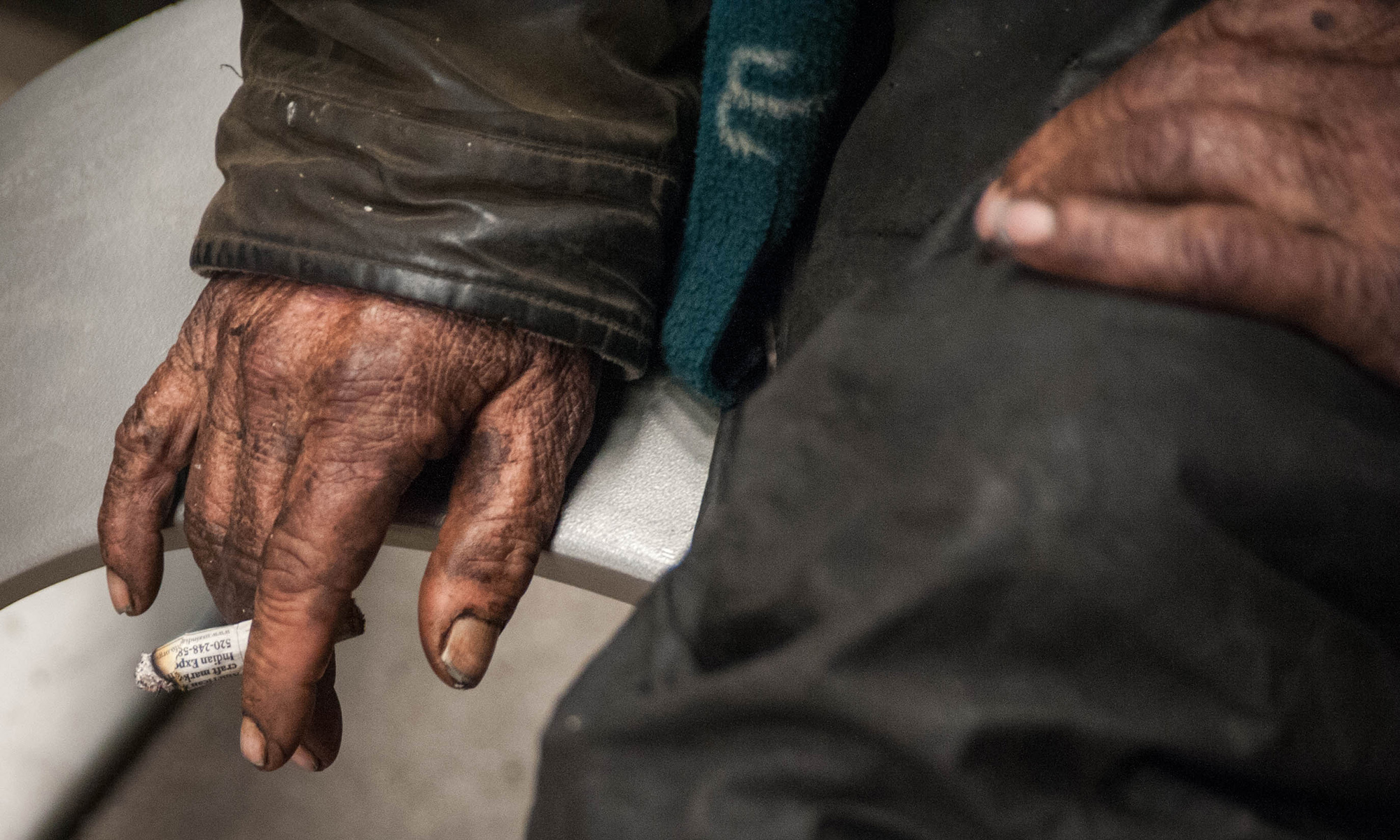
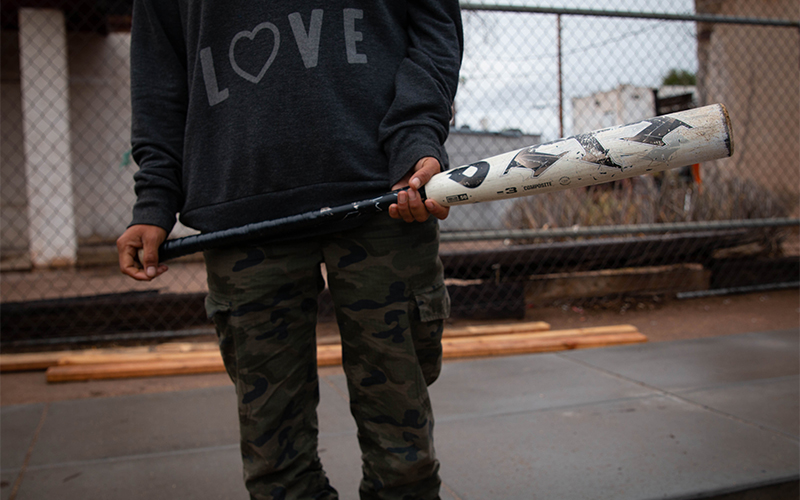
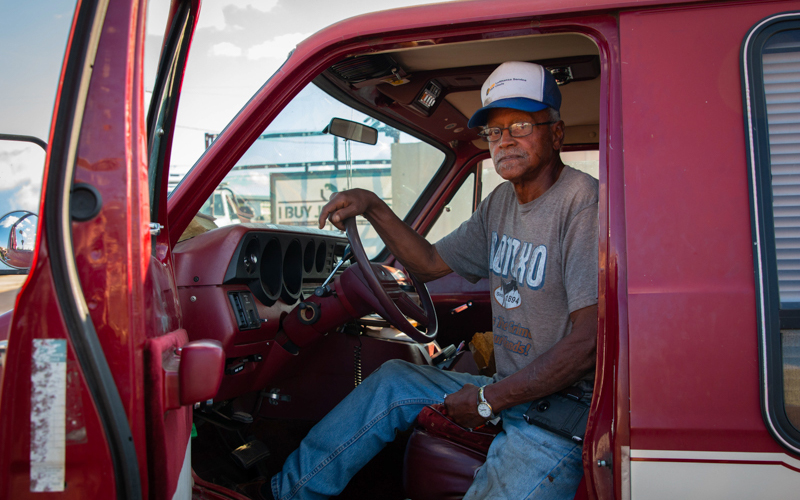
Leave a Comment
[fbcomments]